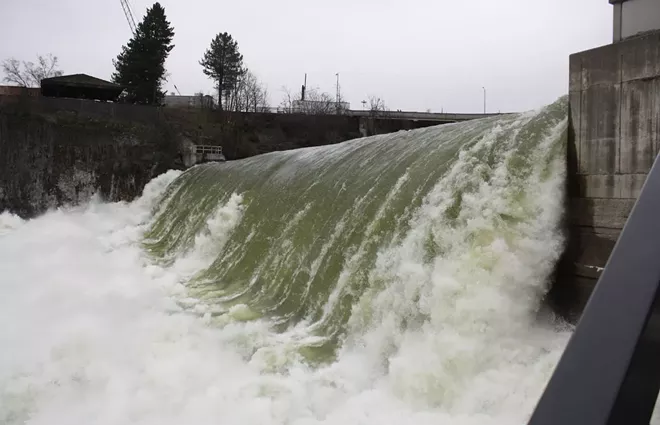Wednesday, May 31, 2017
Lawmakers push to stabilize tax that provides money for Spokane cleanup sites and others statewide
In the midst of Washington’s budget planning, some lawmakers and environmental groups are trying to ensure that a key source of money used to pay for cleanup projects around the state is more stable in future years.
They hope to stabilize the Hazardous Substances Tax, which mainly brings in revenue from oil refineries, as it is a tax based on the wholesale value of hazardous substances brought into the state (read: mostly barrels of oil).
As of now, the tax is volatile from year to year (the most varied tax source in the state, according to the Office of Financial Management) because it is essentially tied to the price per barrel. When oil prices are good, as they were a few years ago, the Model Toxics Control Act (MTCA) funds do well. If oil prices slump, as they have since 2014? Not so much.
How much can that impact cleanups of toxic sites?
In the 2013-15 biennium, the state had $297.5 million in capital budget appropriations for MTCA-related projects, but that dropped to $137.7 million in the 2015-17 budget, according to the OFM.
Coupled with the historic drop in prices was a change in the way the accounts are used: in 2013, the state added stormwater as an explicitly allowed area to focus on under MTCA, and at the same time, changed the way money was handled to spend the account, resulting in a more aggressive approach, says Darcy Nonemacher, legislative director for the Washington Environmental Council.
"At the time we had concerns about that, including adding stormwater explicitly without increasing the tax to account for that extra demand on the system," Nonemacher says. However, "we thought cash management was a good approach at the time — how can you argue against getting more money spent and out the door quicker for cleanup? But at the time, we didn't see the rapid and historic decline in oil prices that started the year after this passed. That was sort of an unfortunate coincidence."
Switching the way the account was handled was risky: under the old model, a project would be approved, and its funding would sit in the account until the expenses were actually incurred. Under the new model, rather than letting the money sit there for years, the legislature allowed new projects to get started in the meantime.
But that meant if (and in this case, when) the revenue declined, "the account
could become unstable because cash balances are not available for previously committed projects," according to the OFM's November 2016 report on MTCA's stability.
Essentially, when times were good, the legislature overspent the account. Even after oil prices started to decline in 2014, they overspent the account again, believing that oil prices would rebound.
They haven't. Yet.
So lawmakers have to figure out how to pay for projects that already received the go-ahead in the budget years when oil prices didn't rebound, as well as how to plan for future work with a revenue system that currently fluctuates with the oil market.
In Spokane, some cleanup projects have benefited from the cleanup accounts, but other projects have been stalled, as MTCA money hasn't been there. City Councilmembers Amber Waldref and Candace Mumm wrote about those issues in a Spokesman-Review editorial in March:
Over the last two years, local stormwater projects, especially on Spokane’s North Side, have been delayed due to a shortfall of expected MTCA funding. MTCA has funded clean-up activities at over and 6,200 sites statewide over the last 28 years. These funds also are targeted to prevent future cleanup sites. For Spokane, nearly $5 million in MTCA funds expected to fund our local efforts never arrived due to a drop in petroleum and gas prices.

Samantha Wohlfeil
Sewage and stormwater improvements around Spokane, meant to prevent contamination from reaching the Spokane River, have been paid for in part by funds from Model Toxics Control Act accounts. The tax relies heavily on the price of oil; in years when oil prices have slumped, with less money in the account, local projects have been delayed.
In an effort to stabilize future cleanup planning, Gov. Jay Inslee proposed a surcharge to ensure that the account would receive a base amount each biennium, but industry pushed back, saying that the base level was too high.
Negotiations led to a proposal for a tiered approach, one that would raise or lower the tax based on the amount of money that has come into the account in a year. The bill keeping that model alive during the second special session, SHB 2182, was originally sponsored by Rep. Strom Peterson (D-Edmonds).
Nuts and bolts and agriculture
Currently, the Hazardous Substances Tax rate is 0.7 percent of the wholesale value of a hazardous product.
Under a proposed tiered approach, the rate would be as follows from 2018 through 2025, according to a report on the substitute Senate bill:
0.9 percent until HST revenues collected in the FY reach $110 million;
0.7 percent until HST revenues collected in the FY reach $170 million;
and 0.21 percent until the first day of the next FY.
The Department of Revenue would adjust the thresholds every biennium.
While most of the money in MTCA accounts comes from those who first own petroleum products in the state, the Hazardous Substances Tax also applies to pesticides and some chemicals, so a higher rate could be a concern for those in agriculture.
Among the farm, oil and gas industry lobbyists who testified against the bill in late April, concerns included:
"We don't need this policy as the forecast has revenues coming back to levels seen at the peak in 2011."
"(Department of Ecology) already has the ability to recoup 100 percent of needed revenue to cover costs."
"Propane should not be considered a hazardous substance."
"We need to maintain certainty for the agricultural industry and not drive up the input costs on farmers. This bill drives up the input costs on farmers and foresters; stop over committing the account. This is nothing short of a tax increase on farmers."
But others consider the tiered approach to be a balanced one.
"There's a little something for everyone," Nonemacher says. "We get some assurances revenues won't be so low [that] we can't pay our bills, but further out, should prices rebound, the industry paying the tax would see a break."
samanthaw@inlander.com
Tags: MTCA , cleanup , fund , state legislature , Washington lawmakers , toxic , money , budget , News , Image



















